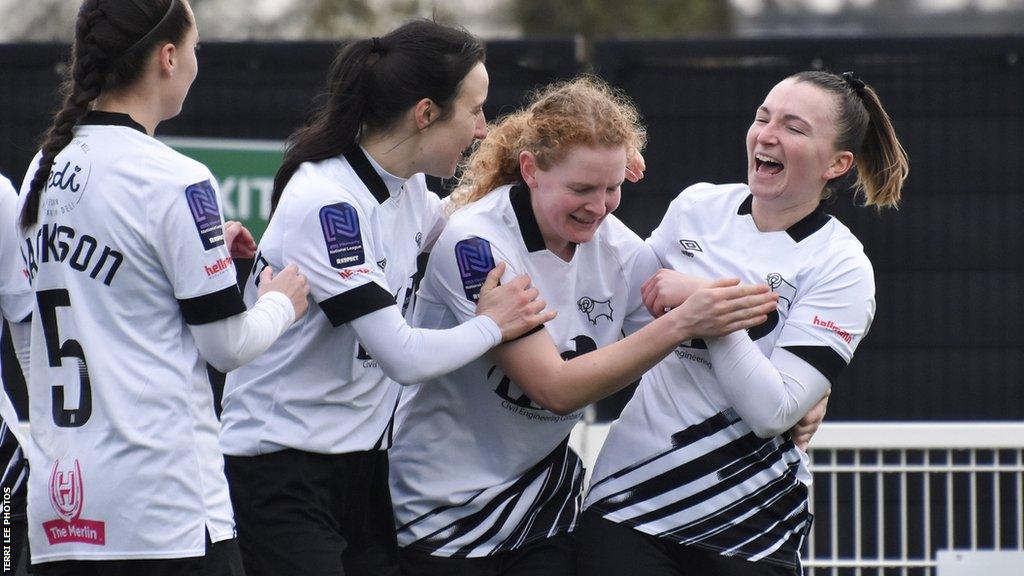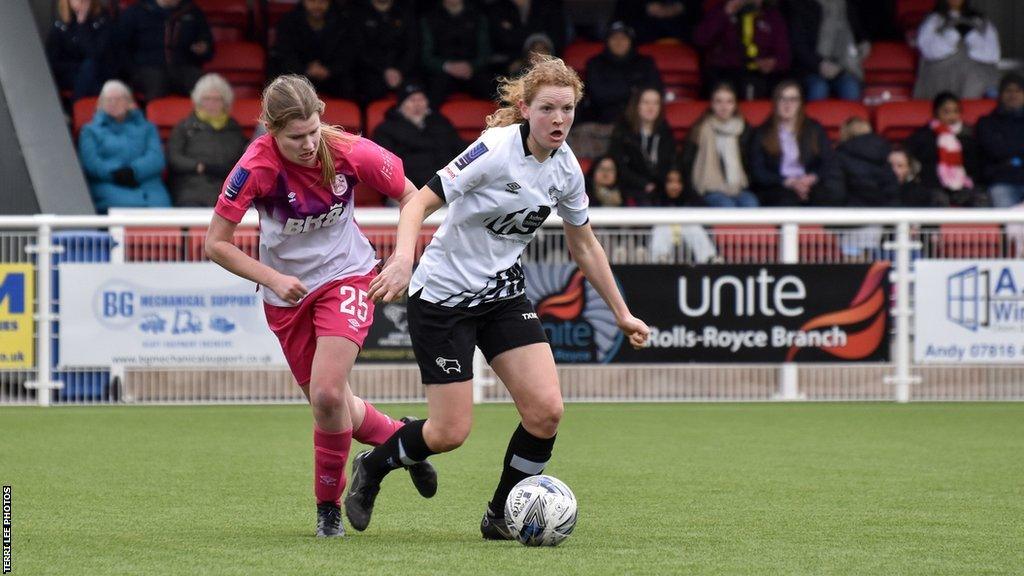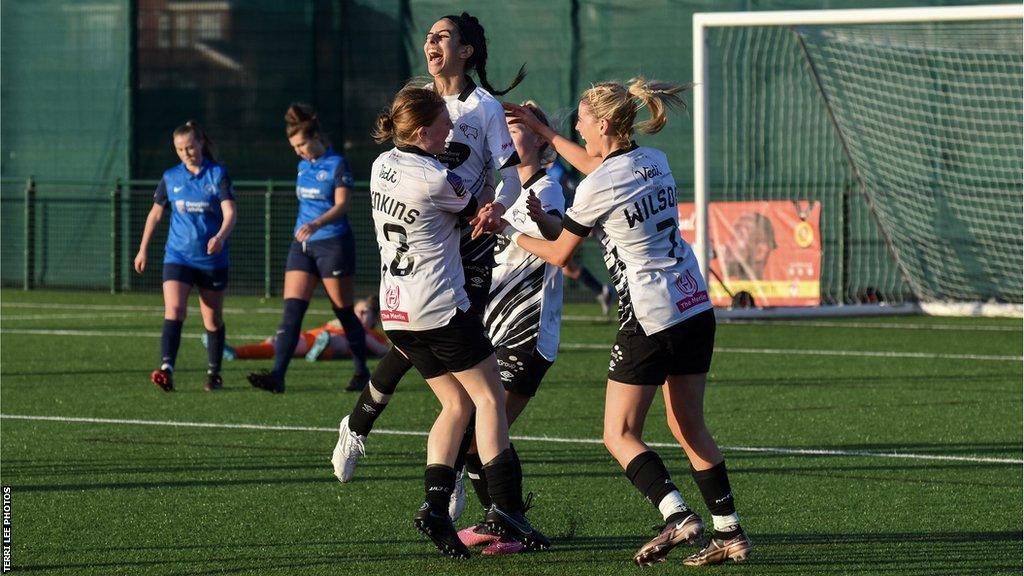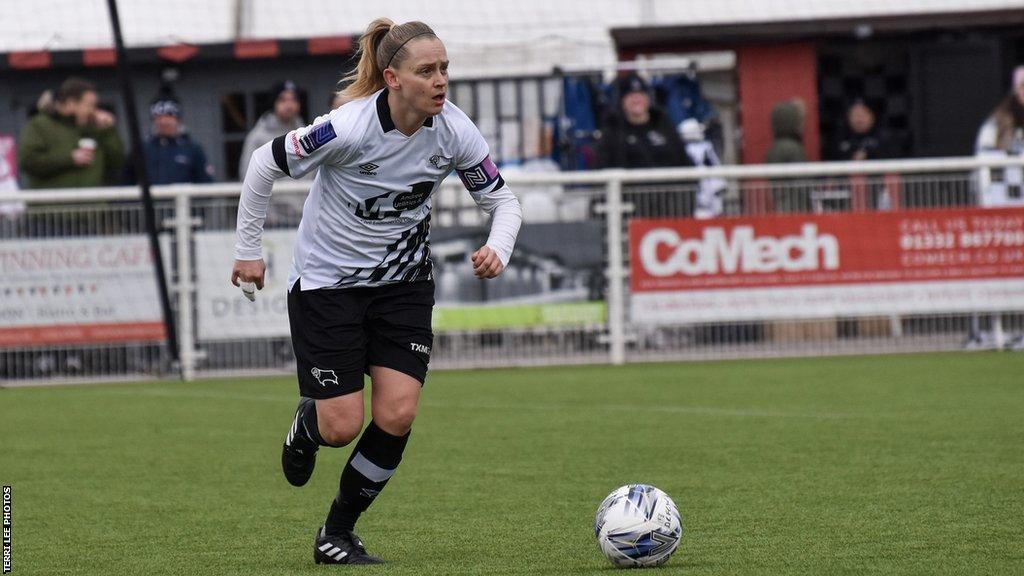Derby County: The Ewe Rams give a glimpse into life in the third tier of women's football
- Published

Derby County play in the Women's National League Northern Premier Division
Washing your own kit, juggling late-night training sessions with full-time work and playing for the love of the game - it is all part of life as a part-time player in the third tier of women's football in England.
Derby County players have shared what it is like in the lower leagues of a sport that has experienced phenomenal growth in recent years.
England captain Leah Williamson spoke of how the Lionesses "changed the game in this country" after their Euro 2022 victory last summer, and while the Women's Super League has enjoyed a surge in interest and financial forecasts for the game are impressive, have players at the semi-professional and amateur level felt the benefit?
Derby this month said they will "fully integrate" the women's team - which has been run by volunteers - into the club, with players and coaching staff handed contracts for the first time.
Ewe Rams midfielder Kira Rai talks about her mission to improve South Asian representation in the game, while captain Hannah Ward and top scorer Amy Sims - who is studying part-time, while working full-time with the NHS - discuss the need for "open conversations" about periods and highlight the demands they face on a daily basis.
"I don't play football to get paid. It's not my aim," Ward told BBC Radio Derby. "I play for the love of it."
'Why compare us to men?'

Amy Sims has made more than 100 appearances for Derby County
Derby County's relegation from the Championship last season meant that for the first time in the club's history, both their men's and women's teams would be playing in the third tier.
The Rams have undergone a high-profile rebuild in League One under new owner David Clowes with former Premier League players Conor Hourihane and David McGoldrick among those brought in.
The women's team, meanwhile, has remained entirely made up of part-time players - the Ewe Rams are run by volunteers, the players have to wash their own kit and they train twice a week at night.
While Rai has always played in girls' and women's teams, both Ward and Sims grew up playing in junior teams with boys.
Being measured against what boys and men do on the pitch is something they have lived with, but Sims says the endless comparisons are unfair because the women's game was banned for almost half a century by the Football Association.
"I don't know how people can compare when you look at the history of football and the fact women were banned for 50 years," she told BBC Radio Derby.
"We are playing in the third tier of women's football and the Derby men's team are playing in the third tier - they are training full-time and we are training four hours a week and playing on a Sunday.
"If I was training all week I'd hope I would be a better player, so it makes it hard to compare."
'I want to see more girls that look like me'
The development of the game is something that Rai has made her life's ambition.
Since first kicking the ball as a junior player at Burton Albion, she has always been the solitary player from a South Asian background on her team.
In her entire career in the lower leagues, the attacking midfielder says she has "probably come up against three" players of similar heritage.
"In a way it's a positive thing for myself that I am, but it's also negative that I shouldn't be the only one," she said.

Kira Rai grew up playing for Derby's near neighbours Burton Albion
While she is training to be a personal trainer, Rai also runs coaching sessions locally in an effort to make a difference.
"I'm trying to get more South Asian girls and more girls from underrepresented backgrounds involved in football," she said.
"I'm trying to put on sessions in my local area and also in Derby to encourage more girls that look like me to play football because there isn't really enough being done for them."
'Life on a conveyor belt'
Derby's Sims on juggling work, study and football
Rai, like her team-mates Ward and Sims, is busy trying to get the work, life and football balance just right.
Ward, who works for a school sports partnership, likens it to life "on a conveyor belt".
"I finish work about 6:30pm, drive home, get changed, wait for Kira to turn up at my door, then go to train between 8-10pm. I get in at 11, shower and get to bed," Ward continues.
"We also have conditioning that is set away from training, so you fit that in with work.
"You get used to the routine, you are on a conveyor belt each week."
Sims says she "must be a bit crazy" as she juggles work with study, as well as her football commitments.
"It's definitely busy and a lot different to what other footballers might go through if you did a day in the life," she said.
"We all have that enjoyment for football, otherwise we wouldn't be doing it."
'Let's have open conversations about periods'

Hannah Ward is Derby County's longest-serving player
And not every week as an athlete is enjoyable.
Sims puts it plainly when she says "it is never the most amazing thing when it's your time of the month and you have to play football".
Understanding how periods affect athletes has become a major talking point in recent years.
Women's Super League club Manchester City have collaborated with the English Institute of Sport to "accelerate the understanding of female athlete health" and the US national team made headlines in 2019 when tracking players' menstrual cycles on the way to winning the World Cup.
In the third tier, the story is very different.
"What frustrates us all more is when you turn up to a changing room and they haven't even got facilities like sanitary bins," Sims said.
"You can't control that [periods] but you can control things around it. You want to feel comfortable, or the most comfortable you possibly can, while playing football."
Research has suggested that anterior cruciate ligament injuries - the most serious kind of knee damage - are more prevalent in female athletes than men.
One contributing factor is that oestrogen - a hormone released during menstruation - can increase joint flexibility, which could result in more damage if an athlete twists a knee.
England and Arsenal midfielder Jordan Nobbs has previously called for more research into the links after suffering the injury herself in 2019.
Ward admits that it was not until recent years that such risks were suggested to her.
"For me personally as a player, I don't know how I'd feel if someone turned around and said 'no, you can't play because you are on your period'," she said.
"It's hard because all we know is to turn up and play.
"It needs more of an open conversation about it and looking after players in that sense."
Compiled by Andrew Aloia, with the Ewe Rams special podcast presented by Amelia Warren and produced by Dominic Dietrich.